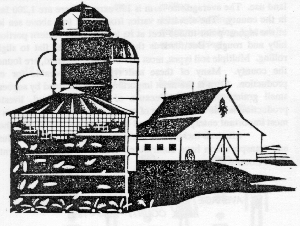


Farms in Knox County range in size, scope, and structure. We have visited farms ranging from 4,000 acres to under a hundred acres; farms which employ millions of dollars of equipment to farms that use only one tractor; farms that are run by a family of four to farms that are run by a family of fifteen; farms that are organized like corporations to farms that are run by individuals. Despite these differences, the common denominator in the Family Farm equation is the family.
The economic values of Knox County are changing. While this change cannot be quantified, various economic challenges test the farmers' abilities to cope in this rapidly changing economic environment. We see differences in size, numbers, and farm financial structure among Knox County farmers.
While economists and social scientists argue about the future economic viability of the family farm, one fact that does seem fairly certain is the widespread economic benefits of a community with a a strong base of independently owned farms. In 1969, social scientist Walter Goldschmidt did a study of two agricultural towns in California: Arvin and Dinuba. Arvin had fewer, larger farms and more seasonal laborers. Dinuba, on the other hand, had many small independent farms worked primarily by families. The differences in the surrounding communities were striking.
In Dinuba there were:
We'll see sparser settlement patterns and a growing number of dying towns. There may be a convenience store in towns located on major roads, but most residents will work in the nearest big city. There will simply stop being large numbers of small, self-contained commmunities --Dan Otto, Iowa State University, extension agent
 E-Mail The Family Farm Project
E-Mail The Family Farm Project